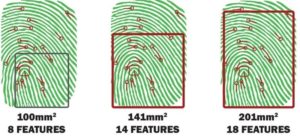 A new study from the University Carlos III of Madrid has found that the accuracy of fingerprint sensors is significantly tied to their size.
A new study from the University Carlos III of Madrid has found that the accuracy of fingerprint sensors is significantly tied to their size.
The study looked at three major sensors and collected 80,000 fingerprints. It essentially found that fingerprint sensors need to be a certain, minimum size to be accurate. Considering a false acceptance rate of 1 in 10,000 to be acceptable, the study found that a 200-square millimeter sensor produced a false rejection rate of less than one percent; whereas a 100-square millimeter sensor brought that rate up to over five percent. Moreover, this was in a sterile, controlled environment, whereas in more challenging conditions the size of the fingerprint sensor would presumably be even more important.
The study was funded by NEXT Biometrics, and the company says its results validate its approach to fingerprint sensor development. In a statement, NEXT CEO Tore Etholm-Idsøe said that the study showed “that size is the key factor in fingerprint sensor accuracy.” He added that while some companies try to cut down on sensor size as a means of reducing costs, NEXT provides “a solution by supplying right sized, uncompromised performance sensors at prices acceptable to the mass market.”
Part of the reason NEXT is able to keep costs low is that late last year it purchased new equipment that significantly improved its production capacity. That in turn allowed the company to pursue previously untapped areas of the market, where prices had previously been seen by clients as prohibitive. Nevertheless, the company has continued to push its technology forward, recently adding ten new engineers to its global team. With the new research evidence backing it up, NEXT shouldn’t have much trouble convincing more new clients of the wisdom of its approach.
—
April 14, 2015 – by Alex Perala


Follow Us